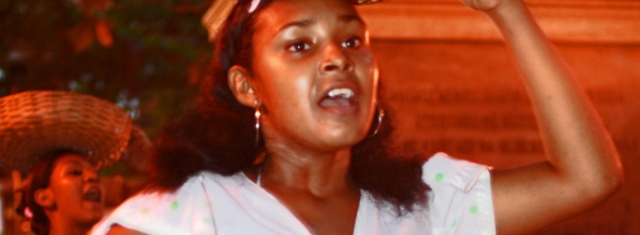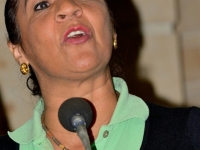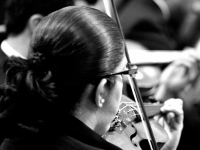News
Living as women in Colombia
How men face changes in Colombia

Women get ready (Source: Roberto Orru)
USPA NEWS -
In Colombia society is changing fast, maybe faster than in any other place in the world: as economy is changing and growing, traditional gender roles are changing too. How is the current state of the art of the balance among genders in the Colombian society?
Latin american countries are traditionally based upon a patriarchal society,
in which roles of men and women are clearly defined: women are who educate children and take care of home and families, while men provide to sustain the family taking care of the family business, traditionally related to agriculture.
Nevertheless, even if this structure is still strongly present, the situation has changed: now women are more and more family providers while they still are the main guidance for their children. They have access to universities, and consequently to many specialized works, even directing their own enterprises.
However, countries like Colombia still are societies made by men in order to promote men.
While women have demonstrated to be able to do everything men do, there is a strong resistance to share with them an equal participation in the society. Most of men, even many educated ones, still consider women first of all like sexual objects, despite of their abilities in their professions.
The fact that women are conquering their own space in their family life as in work environments is being contrasted with unequal salaries, the assignement of duties far below their competences and even sexual harassment or familiar violence.
Colombia didn´t take actions to attend recommendation N.26 of United Nations, in 2008, in which especially Chile, Turkey and Switzerland made enphasis in the necessity to contrast impunity about crimes against women.
According to the United Nations database about violence against women, between january and december of 2011, 70.134 cases of familiar violence were registered,
which, in statistics, means about 8 women attacked every hour. It must be considered that a high percentual of these attacks are not reported to authorities, due to a strong patriarchal education, so nobody knows the real numbers. Also 130 women were assassinated by their partner, and 18.982 cases of rape were reported. Nevertheless only 8 of those murders were classified as “femicide“.
Patriarchal education makes women think that if they´re insulted, attacked or raped it is almost always their fault, for being attractive to men or to “made their man go mad“, so often the resulting shame is the main reason why many of them don´t report themselves to authorities if they are object of violence.
Also, it must be considered that often the violence against women is used as a weapon in the armed conflict that Colombia is still living since early ´60s, like it always happened in almost every other conflict in the world.
Even more terryfing is that the 97,6 of all those cases remains unpunished. This is what happened five years after that United Nations made a strong recommendation about this topic.
At the time it exists a law, the N. 1257 of 2008, which includes means to prevent, to investigate and to punish violence against women in many of its forms.
Nevertheless it happens that, even if this is a valuable juridical instrument, Colombia lacks of a real political will to improve the global situation of human rights referred to women: most of the institutional organizations created for this purpose don´t really work for a new consciousness of gender, which should involve men too. What happens mostly is that those organizations start isolated educational programs in specific zones, but their intervention would be more useful if it could be less sporadic.
Indeed those programs, implemented most of all in critical zones of violence, usually start with good energy, but they also use to end after a while, without caring about if they reach or not the hoped results.
Education doesn´t help much either, since the studies and consequent professions women are encouraged to course are mainly those which are seen as assistential ones: infirmary, teaching, etc.
There are some independent feminist groups which are usually really active and dynamic, all over the country.
In Colombia there have been feminist groups since the fifties. They have been able to conquer many social spaces for women, despite of the fact that their effort hasn´t been recognized very much by Colombian society.
Anyway, nowadays, they appear to be stocked in a political discourse typical of the seventies, which is essentially about revenge, far from a real proposal of building an integration among genders in the society. Obviously, as it is more about a gender conflict than a common construction which involves men, Colombian society doesn´t seem to accept and support their struggle.
Also, Colombia is a country in which catholic church has a deep influence upon every aspect of society, even on politics. So abortion, for instance, is illegal in most of the cases, unless the pregnancy is a risk for health or life itself of the woman, or it is the result of a rape, or the phetus is in conditions of serious malformations which would prevent a future decent life. Anyway all these conditions must be certified by a physician.
Recently we assist to new proposals in the Colombian Congress which try to weaken the legal frame that guarantees the improvement of women´s rights:
A proposal which attempts to modify the law N. 1257 of 2008, in order to minimize the responsabilities of the State in women´s protection rights.
Another one, presented by the General Attorney of the Nation, which looks for the prohibition of therapeutic abortion.
Finally, an already approved modification of the competences of the militar justice, which allows militar forces to have competences about sexual violence against women (in which militar forces are often involved).
Besides, Constitutional Court, through the act 092 of 2008, ordered to National Government to implement 13 new programs in order to prevent and to attend the different risks that women live in the armed conflict, with special regarding to guarantee the effective respect of their civil rights in situations of forced displacement. Five years after this order, National Government still didn´t start any of these programs.
About women´s participation in politics
things aren´t any better: for the electoral period of 2010-2014 elected women represented just the 14,18% of the Republic Congress, and during the last 12 years their presence never exceeded the 15% of the total composition of the Congress.
In last local elections, in 2011, elected women for mayor were just the 10 %, and for Governor just the 9,3%.
In Colombia there is a law that compels to a presence of 30% of women in the highest decisional places of the government. While the very presence of such a law could make think about the necessity to legally force the distribution of power between genders, it is interesting to notice that Colombian government doesn´t accomplish it either:
of the 10 Governative Comitees (superintendencias) which apply control and surveillance on the main economic and social activities in Colombia, not even one is directed by a woman.
Also, even if it is true that there is a presence of women in Colombian government which accomplishes with the law of the 30% (6 ministers of 16), it must be said that it can hardly be seen a difference with previous governments composed only by men, as those women ministers have not implemented politics of gender equity through their ministries.
Work situation also is not well adjusted toward women:
according to data of DANE (Colombian Department of Statistics) between november 2012 and january 2013, just the 46% of women have a job. During the same period, the unemployment percentual of women almost doubled that of men: 13,8% against the 7,7.
The 63% of employed women earned less than the basic salary, which in Colombia is fixed in USD 323,36 for 2013. About the 36% of women workers are occupied in services, like commerce, hotels, restaurants and domestic service.
Finally, as it could easily be expected, women involved in work about human rights are especially object of persecution and even death menaces. According to Mrs.Margaret Sekaggya, special rapporteur about situation of human rights defenders of the United Nations, in her third report presented to UN in december of 2010, she points that the greatest number of death menaces and assassinate attempts to human rights defenders came from Colombia.
In this country also sexual violence is sistematically used as a strategy against women who lead human rights defence, and this phenomenon is increasing highly this last three years, while nobody has been convicted because of those attacks so far.
While this article doesn´t try to suggest a conspiracy theory against women in Colombia, it is a fact that there is a precise attempt to limit their human rights, also as a consequence of a social development in women situation which has been undeniable and continuous these last three decades. Women are obtaining more and more space in Colombian society in every aspect: many of them are economically independent, they are obtaining more academic degrees than men, often they lead their own family, and so on.
Probably this is the reason for this situation: men are heavily reacting because the current situation of Colombian society is shaking the very bases of the patriarchal schemes, women development put in discussion the traditional roles of gender, making them unadequate to actual needs of society itself. Sharing power in any human environment is never easy: there is a real political will to mantein the status quo of patriarchal hierarchy, and sadly it can be seen how this kind of will is not marked by a defined political conservative position, but it is present in men belonging both to right and left wing of politics, despite to the apparent different views regarding these social changes which are happening anyway. This is exactly what is threatening women´s human rights. It would be highly recommendable that the whole world pay attention to what is happening in Colombia right now, in order to help protecting women´s rights in this transiction of social and economic power.
Roberto Orrù
Sources: United Nations Human Rights High Commissioner; DANE; Human RightsWatch; Davide Bocchi; www.somosdefensores.org; SIADHH; Grupo Giepeg UPT
Violence Aggression Sexual Participation Work Society America Latin Colombia Rights Human Danger Politics Gender Women Woman
Liability for this article lies with the author, who also holds the copyright. Editorial content from USPA may be quoted on other websites as long as the quote comprises no more than 5% of the entire text, is marked as such and the source is named (via hyperlink).










